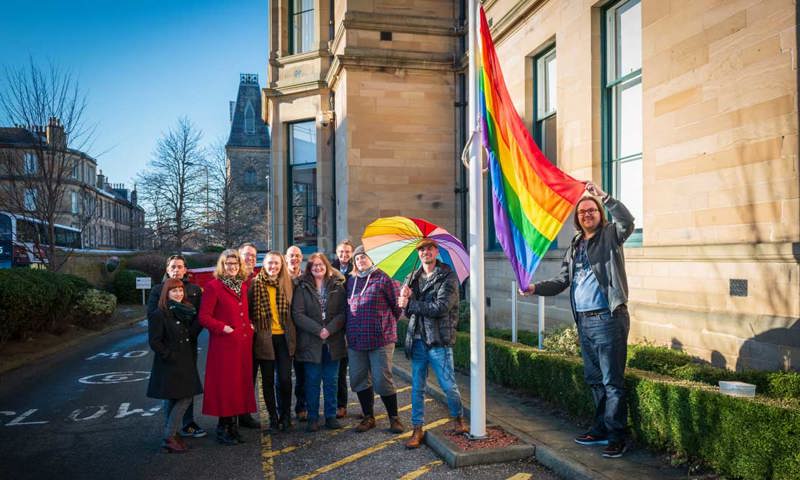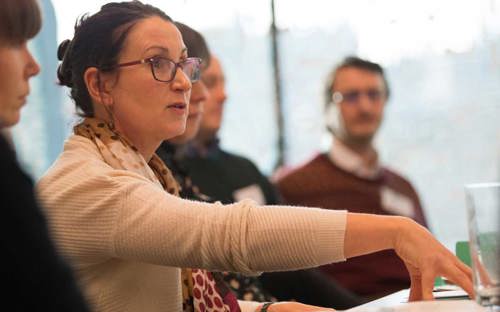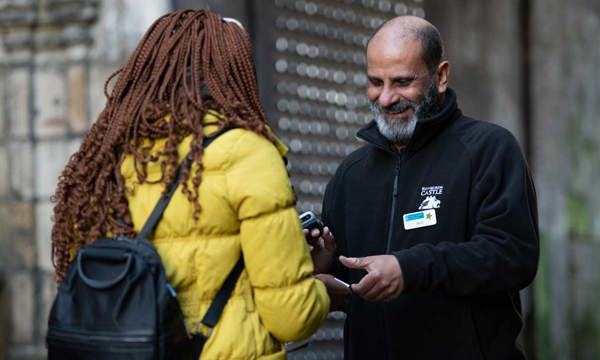1 Heritage for all
Historic Environment Scotland is working hard to improve access and widen participation in Scotland’s historic environment.
We believe everyone should be treated fairly and that no one should be denied opportunities or discriminated against because of factors such as their age, disability, gender re-assignment, race, religion or belief, sex, sexual orientation, marital status or pregnancy.
Scotland’s history belongs to everyone. We want it to be understood, shared and enjoyed by all.
To make this possible, we:
- collaborate with external partners such as Young Scot, Additional Support schools, disability advocacy groups, LGBTQI+ organisations like LGBT Youth Scotland, and Black, Asian and minority ethnic heritage organisations. With the support of our partners, we are reducing barriers and giving everyone a voice on issues that affect them.
- work to make Scotland’s historic places and collections, and our information and services, accessible and inclusive to everyone. Our regularly updated Access Guide and our British Sign Language (BSL) tours are just two examples of how we are doing this.
- promote accurate, representative stories from every part of Scotland’s history. From exhibitions celebrating women's history, crowd-sourcing people and places from LGBT history, and commemorating contributions to Scotland’s society by providing a platform for hidden voices to be shared and celebrated as part of Scotland’s diverse history.

Our LGBT+ Employee and Workplace Allies Network launched in 2019.
2 Equal opportunities in employment
Equal opportunities in Employment
Equality and diversity are key to Scotland’s success. We aim to employ a workforce that reflects, at all levels, the diversity of our society.
To make this possible, we are an equal opportunities and Living Wage accredited employer. With our staff, volunteers and partners, we shape and promote opportunities for training and volunteering relevant to a wide range of people. Find out more about our employment values.
In 2019, we launched our LGBT+ Employee and Workplace Allies Network which offers support for our staff, informs policy reviews within the organisation and helps build awareness of LGBT+ history and culture.
The health and wellbeing of our staff is extremely important to us. We’ve been an award-winning Healthy Working Lives organisation for three years in a row and we will continue to build on this success to enhance the benefits and opportunities for all our staff.
We seek to reward all our staff fairly. We publish our gender pay gap annually. The trends over the past 3 years show the gap has been relatively steady as outlined in the table below:
| Year | 2017 | 2018 | 2019 | 2020 |
| Male (mean) | 12.99 | 13.01 | 13.34 | 14.53 |
| Male (median) | 11.50 | 11.50 | 11.84 | 12.57 |
| Female (mean) | 12.81 | 12.84 | 13.26 | 14.74 |
| Female (median) | 11.50 | 11.50 | 11.84 | 12.57 |
| All (mean) | 12.91 | 12.94 | 13.30 | 14.63 |
| All (median) | 11.50 | 11.50 | 11.84 | 12.57 |
| Male/Female (mean) | 1.4% | 1.3% | 0.6% | -0.1% |
| Male/Female (median) | 0.0% | 0.0% | 0.0% | 0.0% |
Throughout 2018, our Board participated in the Scottish Government 50/50 programme which aims to tackle the under-representation of women in public and corporate leadership.

3 Mainstreaming equality
Mainstreaming equality
Our mainstreaming activities aim to integrate equality, diversity and inclusion into our day-to-day work.
We need to understand how we currently operate in order to identify improvement actions. High level support from the Senior Management Team and leaders in the wider sector help to drive forward our initiatives and long term culture change.
- Strategically
We are reviewing our strategy, policy and decision making processes to ensure equality, diversity and inclusion is at the heart of our work. - Legally
In line with our statutory duties, we undertake Equality Impact Assessments (EqIA). These assessments verify that all our policies, procedures and practices foster respect, advance equality of opportunity and guarantee fairness. - Regulatory
We publish Equality Outcomes and Mainstreaming Reports which set out our three equality outcomes our progress in meeting them.
| Outcome | Success defined by |
| Our Society | We make a real difference to people’s lives |
| Our Services | We deliver responsive services to meet the needs and expectations of diverse groups |
| Our People | We attract, recruit, and develop a diverse Board, workforce, and volunteer base |
Each year, our actions are reviewed during annual equality planning as part of our Annual Operating Plans. These outcomes will be formally reviewed in 2025.
4 Our commitment on Heritage, History and Race
Through the principle of heritage for all, we aim to make the historic environment an open, inclusive, and safe space for everyone. A space where they can engage, have an equal voice, and feel a sense of belonging. As an organisation we know that we need to do more to tackle inequality. Many people still feel apprehensive about how to explore Scotland’s global histories, and how best to build relationships with our diverse communities in a manner that acknowledges our shared history, that tells all sides of the story candidly, and that builds trust.
Background
Research by academics, heritage professionals, and local communities is increasingly uncovering the legacies of Scotland’s involvement in empire, colonialism, and slavery (see links at end). Scots of all backgrounds played a role in these activities. Scottish people had a profound impact on societies and indigenous communities across the globe.
These legacies were not just felt abroad. They shaped the way that Scotland developed as a nation: from the way people thought and felt, to the built environment and landscapes they lived in. Many of these aspects continue to shape Scotland’s story today. We acknowledge this history, and its implications for our historic environment.
We also recognise that there are differing views about our history and the impact of empire and colonialism on our society. But history has nevertheless left us with institutional and systemic barriers that have shaped – and continue to rein-force - modern inequalities, including racism. We have a rich opportunity to ad-dress this aspect of our heritage, to reflect our multicultural population, and to create new ways in which to bring our diverse communities together.
Principles Behind this statement
We published the Equality Outcome Report in April 2021, 2021-25 Equalities Out-comes and Annual Action Plan, with focus on:
Our People: We attract, recruit, and develop a diverse Board, workforce, and volunteer base
Our Services to the Public: We deliver responsive services to meet the needs and expectations of diverse groups
Our Society: We make a real difference to people’s lives
Our Commitments
We acknowledge that colonisation, empire, and slavery had a human cost, and generated legacies that remain with us to the present day through racism and prejudice. We believe that having a truer insight into our country’s complex history will help with our commitment to create a more inclusive understanding of the past and help to shed light on under-represented or marginalised people, and events that have shaped our modern nation.
We also acknowledge that the heritage workforce is not as ethnically and culturally diverse and does not represent the demographic make-up of modern Scotland. We commit to taking steps to address this lack of diversity in the workforce. Heritage is for all and there should be opportunities for individuals of all backgrounds to learn skills and have a rewarding and progressive career in the
historic environment sector. We will identify and strive to dismantle the barriers to entry and progression to ensure that anyone, regardless of their background, can have a role to play in preserving and showcasing heritage. Where necessary, we will take positive action to overcome the barriers to employment specifically facing marginalised communities.
The principles of justice, fairness, and equality lie at the heart our vision of heritage for all. To the best of our ability, we commit to providing a clear and honest picture of Scotland’s history being conscious of issues around bias and misrepresentation. This will not always be easy, as the historical record is partial and gives us a glimpse of only certain people and places across time. But by involving communities in our work, and by making greater effort to listen to and learn from what they are telling us, we can still improve the inclusivity of the stories we tell, and the decisions we make. To support this, we will create both physical and digital spaces that are inclusive for all the people of Scotland. We will make sure that we co-create and co-design with our communities with meaningful engagements.
Facing some parts of our past and their influence on the present day might be challenging for some of us. Our aim is to learn from our past, to connect better with our present, and to make our future a more desirable place for all.
The detail of the action we take will feature as part of annual Equalities Action Plan, published in pursuance of achieving our overarching equalities outcomes. Programmes, projects, and other activity connected to delivery of this statement and wider equality outcomes will be highlighted as set out in our annual Equalities communications plan – comprising a mix of online and social media publication, seminars and events, and report.
Heritage, History and Race statement – evidence of actions
What are we doing to address diversity and inclusion in HES (Historic Environment Scotland)?
- We published our 2021-25 Equalities Outcomes and associated high level actions in April 2021.
- We re-launched our mandatory equality, diversity, and inclusion training
- We have promoted equality initiatives, projects, and events through internal and external communications channels, including social media.
- We have established a Global Diversity Network, sponsored by a member of our Executive Leadership Team and with budget to deliver activity.
- We have rolled out our inclusive recruitment toolkit across the organisation which includes an unconscious bias checklist.
- We have refreshed our mandatory recruitment training to address issues of bias and highlight the importance of diversity and inclusive practice.
- We will promote importance of providing equality data, continue to analyse our equality monitoring information from applicants, employees, and volunteers and use it to inform targeted in.
- We are partnering with West of Scotland Regional Equality Council (WSREC) who are going to support us over the next two years to ensure the workplace and recruitment process is equitable, diverse, and inclusive – this will include reviewing our recruitment policy and recruitment systems and procedures. The project is in its early stages but already has a positive impact.
- We are working to achieve the LGBT Charter Mark for HES in partnership with LGBT Youth Scotland.
- We have signed up for Public Social Partnership (PSP) funding Programme with Scottish Union of Supported Employment. The programme aims to reduce the Disability Employment Gap and involves in building capacity to attract, recruit, and retain disabled people and those with long-term health conditions.
Examples of projects we are undertaking:
- Managing Imperial Legacies is a two-year project funded by the Royal Society of Edinburgh and involving the University of Edinburgh, Historic Environment Scotland (HES) and the Coalition for Racial Equality and Rights (CRER). Two days Conference hosted by HES in June 2022 was a great success and concluded main phase of the project.
- Rediscovering the Antonine Wall Project: This National Lottery Funded project involved a series of community led engagement projects, including a partnership with 'Cycling Without' to help the less mobile to visit Antoine Wall sites using a trishaw, contributed to the creation of five Roman-themed playparks, and engagement with refugee-led community groups to celebrate diverse forms of storytelling and the discover global connections of local areas in the past and present.
- Eternal Connections Project: Fragments of Islamic glass found at Caerlaverock Castle inspired an AHRC (Arts and Humanities Research Council) funded collaborative community project to recreate the original object. We engaged with two community groups, AMINA Muslim Women's Resource Centre and the Muslim Scouts of Edinburgh to stimulate discussion around the heritage of Scotland's Muslim communities, and to undertake a range of creative practice in response both to these stories, and the 3D replicas of the medieval Islamic glass beaker. The project ran from February to August 2022
- 'Properties in Care and the British Empire' research project: This recently commenced project aims to investigate and understand the imperial connections of the PICs (Properties in Care) (Properties in Care), by situating their historical owners within the activities of the British Empire, including the transatlantic slave economy and other colonial activities. The research commission is underway. The anticipated date for the final report is Spring 2023.
- We are currently leading the review and refresh of Scotland's historic environment strategy, Our Past Our Future, and have facilitated pre-consultation engagement workshops with Making Rights Real women's groups, Shakti Women's Aid women's group, and a Kurdish Women's group
- We actively promote Black History and South Asian History Months inviting people to post blogs, e.g.,
- Scotland's Hidden South Asian Heritage
- A Scottish South Asian immigrant story
- Black History Month in St Andrews
- Stuffed birds and a missing plaque: The story of John Edmonstone
Further links
Legacies of Slavery
Scotland and the Slave trade
Museums Galleries Scotland (Scottish Government): Empire, Slavery and Scotland’s Museums,
National Trust Scotland: Facing our Past.

